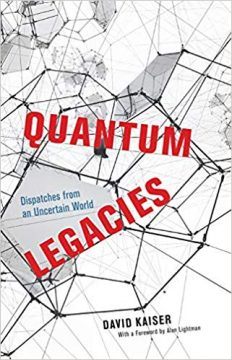 Michael D. Gordin in the LA Review of Books:
Michael D. Gordin in the LA Review of Books:
TRAINING TO BECOME a physicist is really hard work. I know because I’m not one. A long, long time ago, in a galaxy far, far away, I thought I might become a physicist but instead, early in college, I became captivated with the history of science and have never looked back. Well, almost never. My advisor in graduate school, out of what I am sure to him felt like benevolence but to me more like sadism, insisted that I keep enrolling in advanced courses in physics. As he put it in 1998: “In two years the physics of today will be last century’s physics, and you will want to be its historian.”
One of the physics courses I took was an advanced laboratory. It contained two kinds of students: undergraduate whizzes in experimental physics, who were rendering helium superfluid and measuring sound waves, and those in the other half of the room, all of them standing agog. Required to be there in order to prove their bona fides as “real physicists,” this second half (excluding me, the historian) was composed of graduate students in theoretical physics who were only marginally more competent at manipulating voltmeters than I was.
My lab partner was one of these theorists, earning a joint PhD in physics and the history of science. Our lab reports contained the best “historical overviews” any of the instructors had ever seen, if not the best results. Perhaps the most comic of the three experiments we performed was an attempt to verify the irreducible weirdness of quantum mechanics, a quantity called “Bell’s inequality.”
More here.
